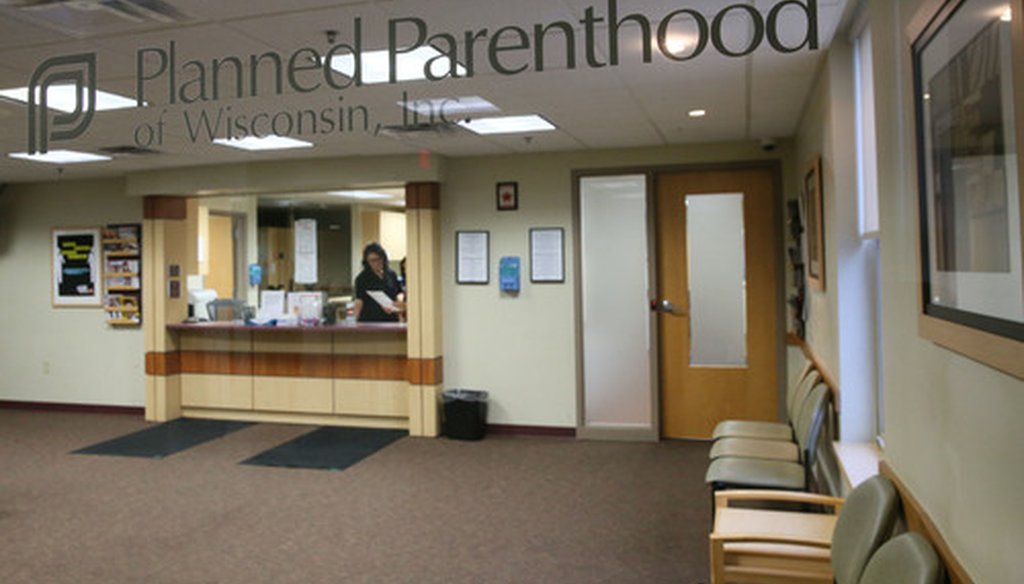



A Planned Parenthood of Wisconsin, Inc. clinic on South 7th Street in Milwaukee prepares to open in the morning on March 17, 2017. (Michael Sears / Milwaukee Journal Sentinel.)
In 2019, Gov. Tony Evers attempted to expand funding for groups like Planned Parenthood that provide abortion services, but the proposal didn’t get through the budget process.
If it had passed, taxpayers still wouldn’t be footing the bill for abortions except in rare cases.
The Facebook post also calls Planned Parenthood an abortion business, which is an exaggeration.
In 2018, Gov. Tony Evers campaigned on a promise to restore funding for Planned Parenthood.
It’s an issue that has taken a backseat in the past year, since the Republican-controlled Legislature quashed an expansion of the Affordable Care Act in the state’s biennial budget, essentially nixing Evers’ Healthy Women, Healthy Babies initiatives.
Among other measures, the proposal would have provided state funding to organizations such as Planned Parenthood, which provides abortion services.
Evers’ initiative prompted a Feb. 21, 2019 article from the anti-abortion website LifeNews.com headlined "Wisconsin Governor Tony Evers Wants to Force Residents to Fund Planned Parenthood Abortion Business."
So, why are we talking about a year-old article now?
It gained new life on Facebook after a April 23, 2020 post in a "Recall Tony Evers" Facebook group that has been shared more than 300 times.
The post was flagged as part of Facebook’s efforts to combat false news and misinformation on its News Feed. (Read more about our partnership with Facebook.)
Evers’ proposal would have allocated funding to Planned Parenthood. But Wisconsin law prevents state or local tax dollars from being used to subsidize abortions, except in rare circumstances.
Let’s see how the claim holds up.
In 2019, Evers introduced a number of initiatives geared toward women and children’s health as part of his proposed budget.
Nearly $28 million would have gone toward services such as cancer screenings, sexually-transmitted infection testing and other policies related to pregnancies and births. The bill would have routed federal funds from the family planning and women’s health block grant programs to Planned Parenthood and other entities.
The proposal also would have allowed the health-care providers to share "nondirective" information about pregnancy termination as part of family planning services. Generally speaking, that means they could discuss the option.
One important note: Wisconsin generally can’t use state or federal tax dollars to pay for abortions. And that wouldn’t have changed under Evers’ proposal.
State law only permits money going toward abortions when a woman is a victim of sexual assault or incest, or if the abortion is necessary to save her life. Funding is also permitted if the woman has a preexisting health condition and the procedure would "prevent grave, long-lasting physical health damage to the woman."
Wisconsin’s policy mirrors the Hyde Amendment, which bars the use of federal funding for abortions in most cases. A 2005 study from the Guttmacher Institute showed 4% of women had an abortion because of health concerns, while less than 0.5% were victims of rape. That suggests exceptions to the policy are not common.
So, Evers’ proposal would have restored funding — cut under former Gov. Scott Walker — that went to Planned Parenthood, which provides abortions.
But the money never made it into the final budget, and even if it had, it would have generally been barred from paying for abortions.
Another part of the claim labeled Planned Parenthood an abortion business. That caught our eye.
According to Planned Parenthood’s 2018-2019 annual report, the organization’s health centers performed 345,672 abortions from October 2017 to September 2018 — the most recent data available. Planned Parenthood of Wisconsin reported just over 4,600 abortions for the 2017-2018 fiscal year.
In Wisconsin, Planned Parenthood also provided around 105,000 sexually-transmitted infection tests, 5,300 cervical cancer screenings, 13,000 pregnancy tests and 860 breast exams.
Nationwide, patients visited Planned Parenthood for contraception, prenatal services, and preventative care like pap tests or HPV vaccinations. Testing for STIs and HIV accounted for half of all services provided.
Abortions comprised 3.5% of those services.
Even at that rate, Planned Parenthood is still the largest provider of abortions in the United States. But to call it an abortion business is a stretch, as the organization provides other services far more often.
A Facebook post links to a 2019 article that claimed Evers "wants to force residents to fund Planned Parenthood abortion business."
Evers tried and failed to restore funding for entities like Planned Parenthood that also provide abortion services. But even if the measure had passed, under state and federal law the money generally couldn’t have gone to pay for abortions.
Finally, it’s an exaggeration to call Planned Parenthood an abortion business, when abortions make up a small portion of the services offered.
A statement is Mostly False when it contains some element of truth but ignores critical facts that would give a different impression.
That fits here.
Funding in doubt after Republicans ax ACA funding, PolitiFact Wisconsin, May 28, 2019.
Gov. Evers Announces "Healthy Women, Healthy Babies" Initiatives in State Budget, Governor Tony Evers, Feb. 21, 2019.
Annual Report 2018-2019, Planned Parenthood, accessed April 27, 2020.
Fiscal year 2017/18, Planned Parenthood of Wisconsin, accessed April 27, 2020.
Glenn Grothman says Planned Parenthood is leading abortion provider, PolitiFact Wisconsin, May 25, 2017.
Reasons U.S. Women Have Abortions: Quantitative and Qualitative Perspectives, Guttmacher Institute, accessed April 29, 2020.
In a world of wild talk and fake news, help us stand up for the facts.
